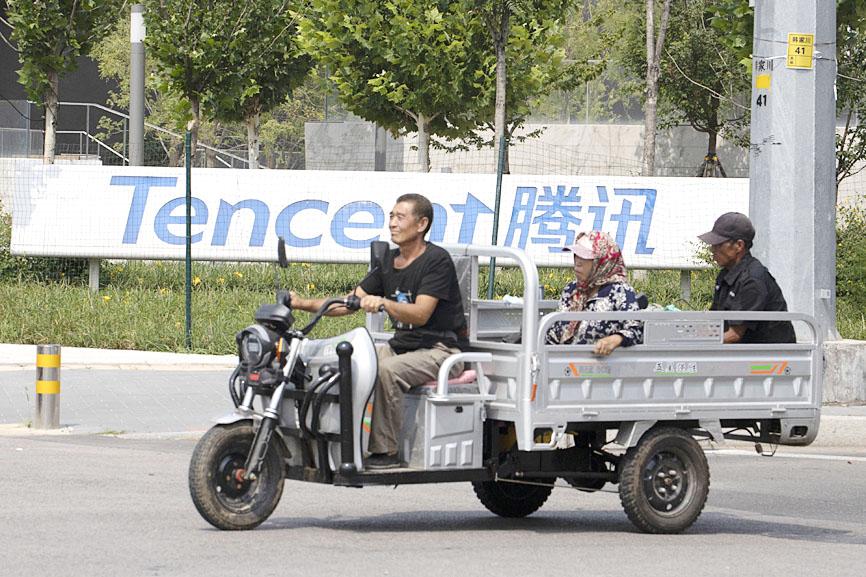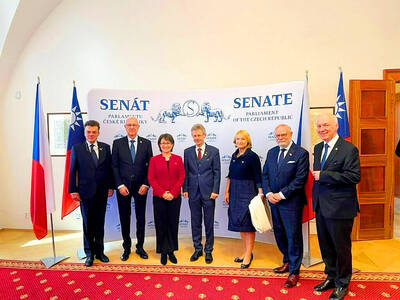US President Donald Trump has announced sweeping restrictions against Chinese-owned social media giants TikTok and WeChat, his latest explosive move aimed at countering China’s rising global power.
Trump on Thursday signed executive orders giving Americans 45 days to stop doing business with the Chinese platforms, effectively setting a deadline for a potential pressured sale of viral video sensation TikTok to Microsoft Corp.
Trump cited national security concerns for the moves, which also threw into doubt the US operations of WeChat’s parent firm, Tencent Holdings Ltd (騰訊), a powerful player in the video gaming industry and one of the world’s richest companies.

Photo: AP
Trump has taken an increasingly heavy hammer to US relations with China, challenging it on trade, military and economic fronts, and Thursday’s effort provoked more outrage in Beijing.
The new restrictions sent Tencent shares into a spin, with the issue tanking as much as 10 percent at one point in Hong Kong trade, wiping almost US$50 billion off its market capitalization.
Asian markets also took note, with investors concerned about increasingly bitter relations between the economic titans, which some fear could lead to a renewal of their painful trade dispute.
Officials from both sides are due to meet on Saturday next week to review a trade deal signed earlier this year.
“TikTok automatically captures vast swaths of information from its users, including Internet and other network activity information such as location data and browsing and search histories,” Trump’s order said.
Data could potentially be used by China to track the locations of federal employees and contractors, build dossiers on people for blackmail and conduct corporate espionage, the order said.
Beijing slammed the move as “arbitrary political manipulation and suppression” and said that it would come at the expense of US users and companies.
TikTok said in a statement that it would “pursue all remedies available to us in order to ensure ... our company and our users are treated fairly — if not by the administration, then by the US courts.”
Trump’s order contended that WeChat captures user data that could then be exploited by the Chinese government, but provided no evidence that this is happening.
“WeChat captures the personal and proprietary information of Chinese nationals visiting the United States, thereby allowing the Chinese Communist Party a mechanism for keeping tabs on Chinese citizens who may be enjoying the benefits of a free society for the first time in their lives,” the order said.

FREEDOM OF NAVIGATION: The UK would continue to reinforce ties with Taiwan ‘in a wide range of areas’ as a part of a ‘strong unofficial relationship,’ a paper said The UK plans to conduct more freedom of navigation operations in the Taiwan Strait and the South China Sea, British Secretary of State for Foreign, Commonwealth and Development Affairs David Lammy told the British House of Commons on Tuesday. British Member of Parliament Desmond Swayne said that the Royal Navy’s HMS Spey had passed through the Taiwan Strait “in pursuit of vital international freedom of navigation in the South China Sea.” Swayne asked Lammy whether he agreed that it was “proper and lawful” to do so, and if the UK would continue to carry out similar operations. Lammy replied “yes” to both questions. The

Two US House of Representatives committees yesterday condemned China’s attempt to orchestrate a crash involving Vice President Hsiao Bi-khim’s (蕭美琴) car when she visited the Czech Republic last year as vice president-elect. Czech local media in March last year reported that a Chinese diplomat had run a red light while following Hsiao’s car from the airport, and Czech intelligence last week told local media that Chinese diplomats and agents had also planned to stage a demonstrative car collision. Hsiao on Saturday shared a Reuters news report on the incident through her account on social media platform X and wrote: “I

SHIFT PRIORITIES: The US should first help Taiwan respond to actions China is already taking, instead of focusing too heavily on deterring a large-scale invasion, an expert said US Air Force leaders on Thursday voiced concerns about the Chinese People’s Liberation Army’s (PLA) missile capabilities and its development of a “kill web,” and said that the US Department of Defense’s budget request for next year prioritizes bolstering defenses in the Indo-Pacific region due to the increasing threat posed by China. US experts said that a full-scale Chinese invasion of Taiwan is risky and unlikely, with Beijing more likely to pursue coercive tactics such as political warfare or blockades to achieve its goals. Senior air force and US Space Force leaders, including US Secretary of the Air Force Troy Meink and

Czech officials have confirmed that Chinese agents surveilled Vice President Hsiao Bi-khim (蕭美琴) during her visit to Prague in March 2024 and planned a collision with her car as part of an “unprecedented” provocation by Beijing in Europe. Czech Military Intelligence learned that their Chinese counterparts attempted to create conditions to carry out a demonstrative incident involving Hsiao, which “did not go beyond the preparation stage,” agency director Petr Bartovsky told Czech Radio in a report yesterday. In addition, a Chinese diplomat ran a red light to maintain surveillance of the Taiwanese